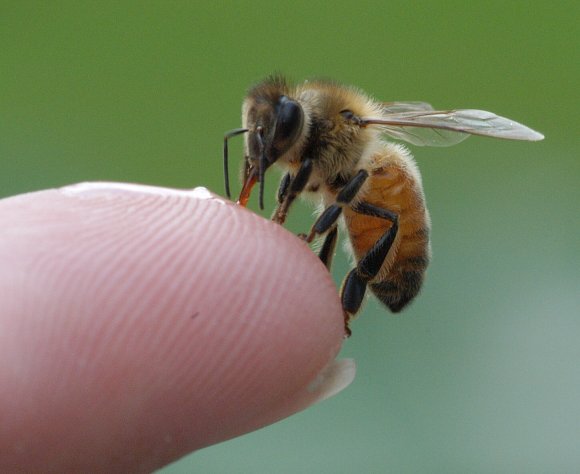Scientists Identify Pathogens That May Be Causing Global Honey-Bee Deaths
 (Science Daily) Researchers have identified potential culprits behind the wide-spread catastrophic death of honey bees around North America and Europe. A team of scientists from Edgewood Chemical Biological Center and University of California San Francisco identified both a virus and a parasite that are likely behind the recent sudden die-off of honey-bee colonies. Using a new technology called the Integrated Virus Detection System (IVDS), which was designed for military use to rapidly screen samples for pathogens, ECBC scientists last week isolated the presence of viral and parasitic pathogens that may be contributing to the honeybee loss.
(Science Daily) Researchers have identified potential culprits behind the wide-spread catastrophic death of honey bees around North America and Europe. A team of scientists from Edgewood Chemical Biological Center and University of California San Francisco identified both a virus and a parasite that are likely behind the recent sudden die-off of honey-bee colonies. Using a new technology called the Integrated Virus Detection System (IVDS), which was designed for military use to rapidly screen samples for pathogens, ECBC scientists last week isolated the presence of viral and parasitic pathogens that may be contributing to the honeybee loss.
Confirmation testing was conducted over the weekend by scientists at the University of California San Francisco. ECBC scientists presented the results of their studies yesterday to a United States Department of Agriculture working group, hastily convened to determine next steps.
For the past year, experts have observed a marked decline in the honey bee population, with entire colonies collapsing without warning. Approximately 50 percent of hives have disappeared and researchers around the country are scrambling to find out why. Scientists have termed this phenomenon “Colony Collapse Disorder” and fear that without honey bees to pollinate crops like fruits, vegetables, and almonds the loss of honey bees could have an enormous horticultural and economic impact around the world.
ECBC is one of many academic, commercial and government concerns studying the honey bee population decline. ECBC’s role will be to identify the extent of the problem and conduct ongoing detection activities.





















A team of scientists from Edgewood Chemical Biological Center and University of California San Francisco identified both a virus and a parasite that are likely behind the recent sudden die-off of honey-bee colonies.
I don’t know why the New Scientist chose to use the word “likely” here. Sloppy reporting. The pathogens have been discovered, and its not unreasonable to suppose that they could be related to the die-offs, but nothing has yet established a causal link (according to the news summaries I’ve read about it so far).
I suspect that is the case so far. I certainly hope some resolution… I’m really not happy about prospect of going back to a world dominated by gymnosperms. Yeah, yeah bracing for joke.
Wow, I hope they find a solution for this! In addition to environmental and agricultural concerns, there is my completely selfish love of honey and beeswax candles.
I bet all the people who do research on native pollinators are dancing jigs right now. They will have lots of funding opportunites and can say “I told you so” to the apiculture folks.